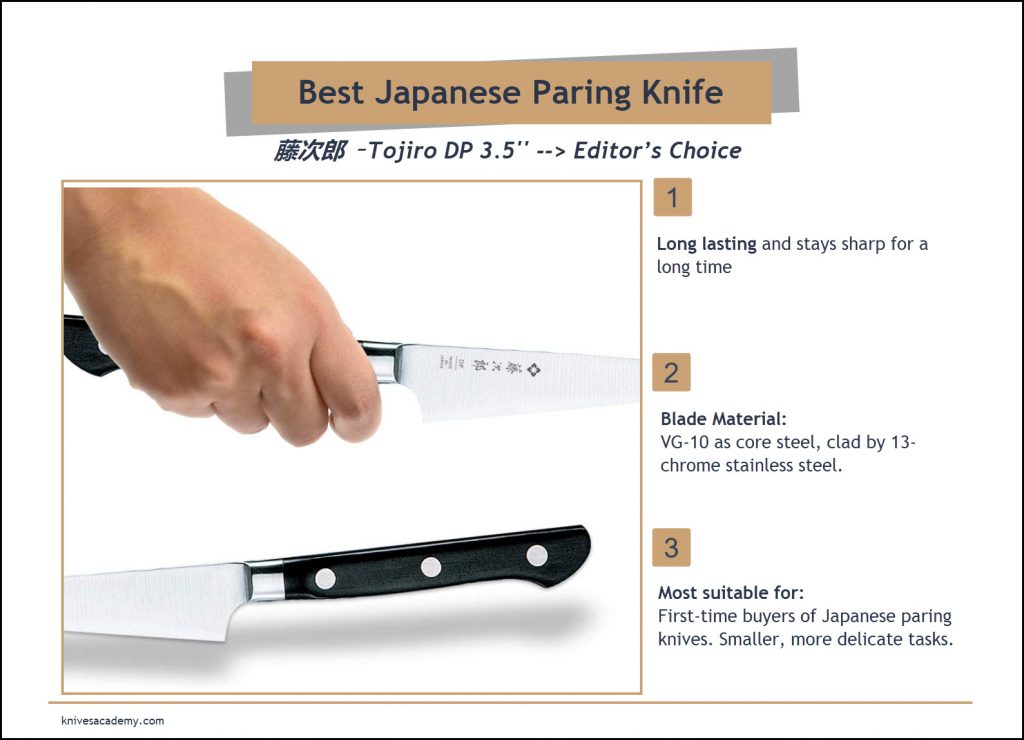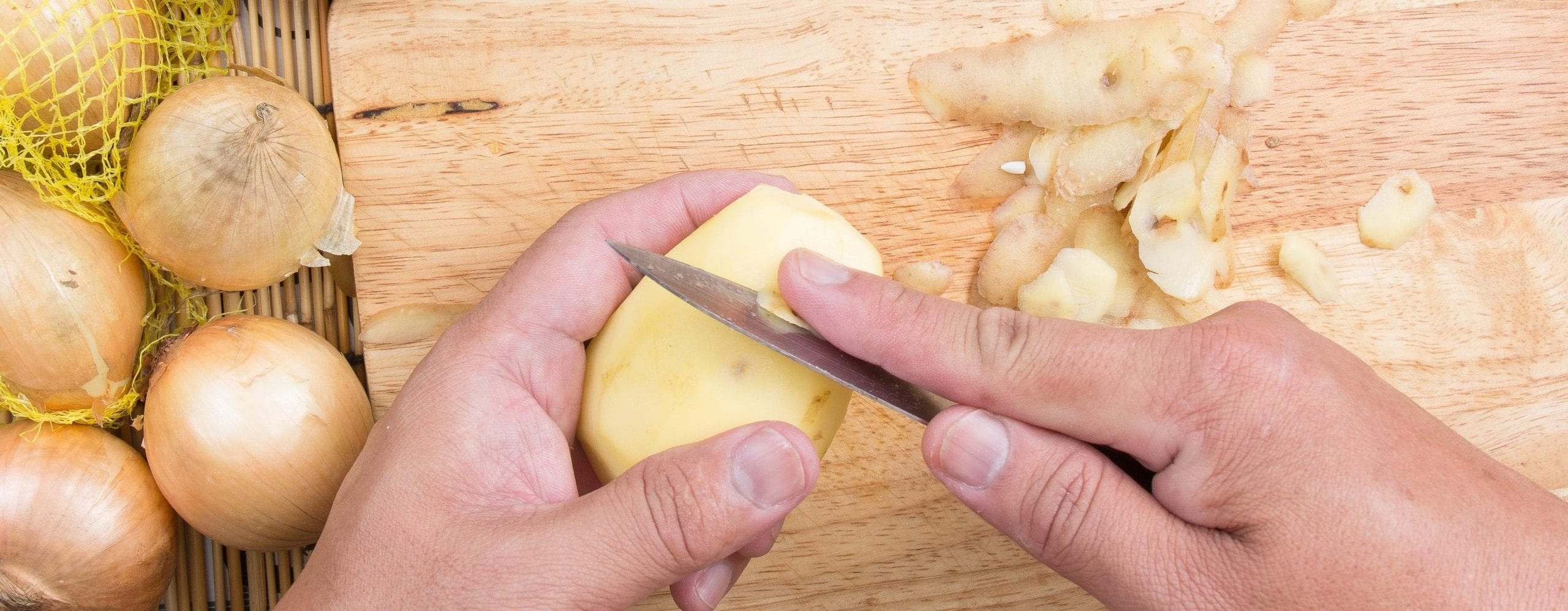On this page, we’ll be discussing some of the best Japanese paring knives available for 2022. We’ve been covering the best paring knives for quite some time now and have some thoughts to share. We’ll evaluate balance, comfort, maintenance, and so much more.

Japanese knives can be found in professional kitchens around the world. They’re not outright favorites for everyone, but those who use them usually swear by them. Japanese paring knives are a more delicate, smaller version of the typical ‘Gyuto,’ or ‘chef’s knife.’
The main differences between Japanese equipment VS their American or European counterparts can be found in their weight and thickness. Japanese knives tend to be lighter with a significantly thinner edge. In the right pair of hands, this can allow for greater levels of control and a sharper cutting edge for a variety of kitchen tasks.
Pressed for time?
Our top paring knife right now is the Tojiro DP 3.5-inch Paring Knife.
It tops the majority of online reviews and comes with the best performance overall in our opinion. It’s worth noting, however, that your preference will be determined by a variety of other factors. Check out our other recommendations and read our chef knife buying guide to be sure.
Top 5 Japanese Paring Knives
  Editor's Choice Editor's Choice | ||||
 | ||||
 Best Bird Beak Japanese Paring Knife | ||||
 | Price | |||
 | Price |
1. Tojiro DP 3.5-inch Paring Knife – Editor’s Choice
First up is this fantastic option from Tojiro. It’s a well-balanced, affordable knife that’s backed by a lifetime warranty and a ton of vocal support online – this product is recommended by practically everyone who’s reviewed it.
Tojiro DP 3.5-inch Paring Knife Specifications
About The Knife
The sub-$50 asking price for this paring knife makes it an excellent option for beginners or those looking to take baby steps into the world of Japanese tools. Don’t be fooled though; more experienced chefs will still find plenty to appreciate.
The stainless-steel handle is relatively comfortable but may feel a touch too small for larger hands. The durability on offer here is exceptional when you consider the price. With a full tang and a forged construction, it should last you for many years to come. Add this to the lifetime warranty, and you’re looking at a purchase that comes with plenty of peace of mind.
Maintenance
durable. You’ll get excellent sharpness retention but will have to work a little harder once it’s time to sharpen your knife. A fine-grain whetstone should be used at a 17-degree angle to hone your blade edges.
Wash your knife by hand with a mild detergent.
Pros:
- Excellent price-to-performance ratio
- Relatively comfortable and lightweight
- Lifetime warranty
Cons:
- The handle is a little small
- The sharpened bevel isn’t fully even
- May lack ‘heft’ for some
2. Shun Premier Paring Knife 4’’
This Shun blade costs a little more than the option listed above but will be the perfect choice for the right person.
Shun Premier Paring Knife 4’’ Specifications
About The Knife
We’re huge fans of the handle on this knife. It was remarkably comfortable and felt secure every step of the way. While it costs a little more than we may have hoped, the exceptional balance of the product more than makes up for it in our opinion.
The use of Pakkawood is particularly noteworthy here. This material offers superior levels of heat resistance, moisture resistance, and overall durability more than most wooden alternatives.
It also has a luxurious glossy finish that we really appreciated. The blade’s HRC of 61 also means that this knife should stay sharper longer than comparable options on the market.
Those looking for a tool that can peel, devein, and help with similarly intricate work will feel right at home with this option. We thoroughly recommend giving it a look.
Maintenance
This knife should not be cleaned in a dishwasher. Use a mild soap/ detergent and hand-wash only. When sharpening knives with an HRC of 60 or higher, use a fine grain whetstone at a 17-degree angle.
Less experienced cooks can take advantage of Shun’s mail-in sharpening service.
To maintain the finish on your Pakkawood handle, apply tung or mineral oil from time to time. Before applying your oil, gently clean with a soft brush to allow for an even application.
Pros:
- Exceptional comfort and security
- Excellent hardness/ sharpness retention
- Stunning Damascus finish
Cons:
- A little expensive
- Not machine washable
- Edge can chip occasionally
3. TUO Paring Knife 2.5″ Dark Knight Series – Best Bird Beak Japanese Paring Knife
This is the best bird beak Japanese paring knife we’ve found; It’s perfect for intricate garnishes that demand that extra level of precision.
TUO Paring Knife 2.5″ Dark Knight Series Specifications
About The Knife
When it comes to ‘cheap and cheerful,’ this option from TUO is tough to beat. Don’t let the sub-$40 price tag fool you, though; this knife performs exceptionally well for the price. When working with a paring knife like this, your main priorities should be balance and grip comfort.
The good news here is that this knife delivers on both of these fronts. You’ll have all the control you’ll need when preparing those final touches for your dish.
One thing to note is that the manufacturer hasn’t provided information about the blade’s HRC rating. That said, the dual layers of titanium are designed to maintain sharpness and durability for significantly longer than stainless steel alone.
As this is a partial-tang knife, care should be taken when making heavier, more substantial cuts.
Maintenance
The heat and harsh detergents of most dishwashers will damage this knife. Only ever hand-wash with mild soaps. A whetstone can be used when sharpening although make sure you’ve experienced it before attempting to hone your blade.
The design of this paring knife means that regular sharpening shouldn’t be necessary.
Pros:
- Fantastic levels of control
- Very affordable
- Looks great
Cons:
- Feels a little light
- Partial tang design
4. DALSTRONG Paring Knife – 3.5″ – Frost Fire Series
A lightweight, attractive knife that’s perfect for those who prioritize speed and efficiency.
DALSTRONG Paring Knife – 3.5″ – Frost Fire Series Specifications
About The Knife
If you’re used to a heavier knife for your kitchen work, this might not be the best option for you. Those who value speed and effortless cuts, however, will absolutely love the design of this one from Dalstrong. It’s built to make short work of your mincing, coring, and other jobs that need to be repeated with efficiency.
We’re particularly fond of the ergonomic handle that allows for a grip that is both comfortable and tension-free.
The blade of this knife is rated between 60 and 61 on the Rockwell hardness scale which means it’s comparatively hard and will retain its sharpness significantly longer than less premium options.
Another bonus in terms of sharpness here is that this knife has been honed using the ancient Honbazuke technique. This involves sharpening the blade vertically, then horizontally, and finally finishing with a leather stropping block.
The result is a superior level of sharpness that should last much longer than you may be used to.
The full-tang, well-balanced design of this option means that it should serve you very well for many years to come. It can usually be picked up for less than $50 which is an absolute steal in our opinion.
Maintenance
As with the other knives listed on this page, you should avoid dishwashers if you care about longevity. Wash with cold to moderate temperatures using mild soaps whenever possible.
To sharpen this blade yourself, use a fine-grain whetstone and sharpen it at a 15-degree angle.
Pros:
- Very agile and fast
- Honbazuke sharpening method
- Gorgeous exterior design
Cons:
- Quite a light knife
- Curved design makes rocking difficult
- Some chipping may occur
5. Sunnecko Damascus Paring Knife 3.5
A full-tang, flexible paring knife that’s perfect for peeling and fruit-related tasks.
Sunnecko Damascus Paring Knife 3.5 Specifications
About The Knife
The first thing to mention here is that the price to performance ratio with this Sunnecko knife is truly remarkable. If you pick it up at the right time, it can cost as little as $30. In our opinion, this represents fantastic value for money.
This is the highest hardness rating featured on this page; this knife falls between 60 and 62 on the Rockwell hardness scale. As stated above, this means two things:
- The blade is very hard and sharp
- It will hold this sharpness for significantly longer than you may be used to
This can be an absolute Godsend in terms of maintenance and durability. You’ll be sharpening and replacing your knife far less often than with fewer premium products. While we’re on the subject of durability, it’s worth mentioning that some users have reported that this knife can scratch fairly easily, so use it with a degree of caution.
As for the handle, there’s more good news to share. It’s made from a glass-based epoxy resin laminate called G10. G10 is made by soaking fiberglass in epoxy resin and then shaping it into the appropriate handle shape by using heat and pressure.
Technical terms aside, this offers a handful of key benefits:
- Superior moisture resistance
- Superior heat resistance
- A broad range of attractive colors are possible
- A comfortable feel in the hand
The result of this material choice is a knife that’s very well balanced and easy to use. The flexibility of the blade makes it perfect for peeling tasks and other fruit-related work.
Maintenance
Sunnecko recommends using a fine grain whetstone to sharpen this knife at a 12-15 degree angle when required. Frequent sharpening shouldn’t be necessary. As with most Japanese knives, this product should only ever be cleaned by hand using moderate temperatures and gentle soaps.
The good news is you get a handy cleaning cloth with your purchase from Sunnecko! Many users on Amazon opt for this sharpening tool for this knife.
Pros:
- Ergonomic, moisture-resistant handle
- Excellent for peeling and fruits
- Great hardness
Cons:
- Quite scratch-prone
- Some find it too heavy
- Can slip if wearing gloves
Conclusion
There we have it! We’re big fans of every single one of the knives listed above. It’s worth taking some time to reflect on what you need your new tool for. Efficient mincing and prep work? Endlessly intricate and decorative flourishes? Your needs as a chef will determine the option that’s right for you.
In general, we’d like to leave you with the following thoughts on Japanese paring knives:
- Always hand-wash with moderate temperatures and mild soaps
- A fine-grain whetstone is ideal for sharpening
- The warranty of your product is worth double-checking
- All the options on this page come with some form of lifetime warranty except for the last Sunnecko knife
If in doubt, we think you should go for the Tojiro DP 3.5-inch Paring Knife.









Post Your Thoughts